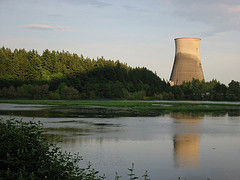
Nuclear power could cost trillions over renewables
Jun 19, 2009 - Brendan Borrell - Scientific American
 Nuclear power plants may not emit greenhouse gases, but they sure could suck in the tax dollars. Nuclear power plants may not emit greenhouse gases, but they sure could suck in the tax dollars.
An analysis by economist Mark Cooper at the Vermont Law School claims that adding 100 new reactors to the U.S. power grid would cost taxpayers and customers between $1.9 and $4.1 trillion over the reactors’ lifetimes compared with renewable power sources and conservation measures.
The analysis factors in studies from Wall Street and independent energy analysts estimating the efficiency of renewable energy at 6 cents per kilowatt hour versus 12 to 20 cents per kilowatt hour for nuclear. Cooper says those costs will fall on either ratepayers through higher electric bills or on taxpayers through large subsidies.
“It is telling that in the few short years since the so-called ‘Nuclear Renaissance’ began there has been a four-fold increase in projected costs,” Cooper said in a statement. “The original low-ball estimates were promotional, not practical; they were based on hope and hype intended to promote the industry.”
Cooper’s study comes on the heels of a recent review of the state of nuclear power by a team from the Massachusetts Institute of Technology. The researchers concluded that nuclear power was not the most cost-effective way to reduce greenhouse gases and that waste management and safety issues must be addressed for it to remain a viable option. In 2003, the MIT team expressed similar skepticism in a report co-authored by John Holdren, now President Obama’s science advisor.
Indeed, any new nuclear plants are a long way from fruition. Although 17 applications for 26 new reactors have been filed with the U.S. Nuclear Regulatory Commission, not one is under construction.
Image of the cooling tower from the Trojan nuclear plant in Oregon courtesy tobo via Flickr

|
Email
this page to a friend
Updated: 2016/06/30
If you speak another language fluently and you liked this page, make
a contribution by translating
it! For additional translations check out FreeTranslation.com
(Voor vertaling van Engels tot Nederlands)
(For oversettelse fra Engelsk til Norsk)
(Для дополнительных
переводов проверяют
FreeTranslation.com )



 Nuclear power plants may not
Nuclear power plants may not